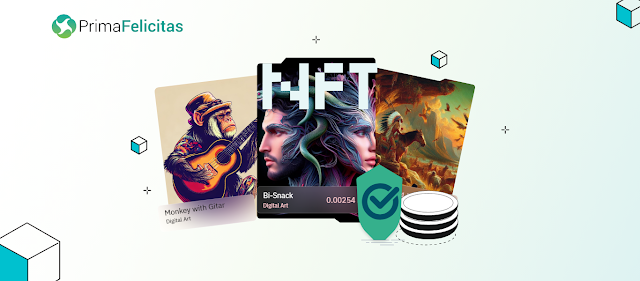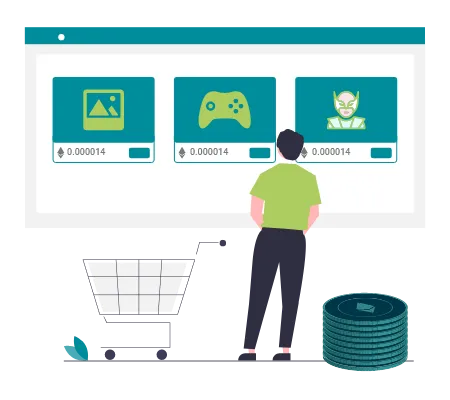How NFT Marketplace Development Services Are Shaping The Digital Art World
NFT marketplace development services are changing the game for digital art by providing a platform for creators to showcase and sell their work, while also giving buyers a secure and transparent way to invest in one-of-a-kind pieces. In recent years, we have witnessed a major shift in the way digital art is bought and sold. With the emergence of NFTs (Non-Fungible Tokens), a new world of opportunities has opened up for artists and collectors alike. And at the forefront of this revolution is the development of NFT marketplace software. In this blog post, we will dive into the world of NFT marketplace development services and explore how they are shaping the digital art world.
Why NFT Marketplace Development Services Are The Future Of Digital Art
NFT marketplace development services are revolutionizing the digital art world. With the rise of blockchain technology, artists and collectors now have a secure and transparent platform to buy, sell, and trade digital assets. These services are paving the way for a new era of digital art, where artists can directly connect with their audience and monetize their work without intermediaries.
One of the key reasons why NFT marketplace development services are the future of digital art is the concept of ownership. Through blockchain technology, artists can create unique digital tokens known as NFTs (Non-Fungible Tokens) that represent ownership of a specific piece of art. This provides artists with a way to prove the authenticity and rarity of their work, as well as establish a direct connection with collectors who are interested in purchasing it.
Moreover, NFT marketplace development services offer artists the opportunity to earn royalties on their work. Unlike traditional art sales, where artists typically receive a one-time payment, NFTs allow artists to earn a percentage of future sales. This means that artists can continue to benefit financially from the success of their work even after it has been sold. This new revenue model has the potential to greatly empower artists and provide them with a sustainable income stream.
In addition to empowering artists, NFT marketplace development services also offer collectors a new way to engage with and support their favorite artists. Collectors can now directly purchase and own digital art pieces, which can be displayed in virtual galleries or even in virtual reality environments. This allows collectors to build a unique digital art collection and showcase it to a global audience.
Overall, NFT marketplace development services are reshaping the digital art world by democratizing access to art, empowering artists, and creating new opportunities for collectors. As more artists and collectors embrace this technology, we can expect to see a vibrant and thriving digital art ecosystem emerge.
How NFT Marketplaces Offer Greater Transparency and Trust
One of the key advantages of NFT marketplaces is the greater transparency and trust they offer compared to traditional art marketplaces. Blockchain technology, which underpins NFTs, provides a decentralized and immutable record of transactions. This means that every transaction made on an NFT marketplace is recorded on the blockchain and cannot be altered or tampered with.
This transparency ensures that artists and collectors can have full visibility into the ownership history of a digital art piece. This eliminates the risk of fraud or counterfeit artwork, as the authenticity of each NFT can be easily verified. Artists can also track the provenance of their work and ensure that their art is being sold at fair prices.
Furthermore, NFT marketplaces use smart contracts to automate the payment and royalty distribution process. Smart contracts are self-executing contracts with the terms of the agreement directly written into code. This eliminates the need for intermediaries, such as galleries or auction houses, and reduces the risk of payment disputes or delays. Artists can trust that they will receive their royalties promptly, and collectors can be confident that their payments are secure.
The greater transparency and trust offered by NFT marketplaces are attracting more artists and collectors to embrace this technology. As the digital art market continues to grow, NFT marketplaces will play a crucial role in building a trustworthy and efficient ecosystem.
Challenges and Opportunities in NFT Marketplace Development Services
While NFT marketplace development services offer numerous benefits, some challenges and opportunities come with this emerging technology.
One of the challenges is the environmental impact of blockchain technology. The process of minting and trading NFTs requires a significant amount of energy, which has raised concerns about the carbon footprint of digital art. However, there are ongoing efforts to develop more sustainable blockchain solutions, such as the use of proof-of-stake consensus algorithms.
Another challenge is the issue of copyright infringement. As digital art becomes more popular and valuable, there is a risk of unauthorized reproductions or plagiarism. NFT marketplaces need to implement robust measures to protect artists' intellectual property rights and prevent the sale of counterfeit artwork.
On the other hand, there are also opportunities for innovation in NFT marketplace development services. For example, the integration of virtual reality (VR) technology can enhance the immersive experience of owning and displaying digital art. VR galleries and exhibitions can provide collectors with a unique way to interact with and appreciate artwork from the comfort of their own homes.
Additionally, NFT marketplaces can explore collaborations with other industries, such as gaming or music, to create new forms of digital art. The intersection of different creative fields can lead to innovative and groundbreaking artistic experiences.
Overall, the challenges and opportunities in NFT marketplace development services require continuous innovation and collaboration to ensure the growth and sustainability of the digital art industry.
The Benefits and Limitations of Blockchain Technology for NFT Marketplaces
Blockchain technology offers several benefits for NFT marketplaces, but it also has its limitations.
One of the key benefits of blockchain technology is the decentralization it provides. Traditional art marketplaces often rely on intermediaries, such as galleries or auction houses, to facilitate transactions. These intermediaries can introduce inefficiencies and additional costs. With blockchain technology, NFT marketplaces can operate in a decentralized manner, allowing artists and collectors to directly interact and transact without intermediaries. This reduces costs, increases efficiency, and enables a more direct and transparent relationship between artists and collectors.
Another benefit of blockchain technology is the immutability of the transaction records. Once a transaction is recorded on the blockchain, it cannot be altered or erased. This ensures that the ownership history of NFTs is transparent and cannot be tampered with. Artists and collectors can have confidence in the authenticity and provenance of digital art pieces, which is crucial in the art market.
However, blockchain technology also has its limitations. One of the main limitations is scalability. The current blockchain infrastructure may not be able to handle the growing demand for NFTs and the increasing number of transactions. This can result in slow transaction times and high fees. Scalability solutions, such as layer 2 protocols or alternative blockchains, are being explored to address this limitation.
Another limitation is the learning curve associated with blockchain technology. While NFT marketplaces strive to provide a user-friendly experience, there is still a learning curve for artists and collectors who may not be familiar with blockchain technology. Enhancing the user interface and providing comprehensive educational resources can help overcome this limitation and onboard more users to the world of NFTs.
In conclusion, blockchain technology offers numerous benefits for NFT marketplaces, including decentralization and immutability. However, scalability and user adoption remain important considerations for the future development of NFT marketplaces.
PrimaFelicitas- NFT marketplace development company
PrimaFelicitas is a leading NFT marketplace development company that specializes in creating innovative platforms for buying, selling, and trading non-fungible tokens. With their expertise in blockchain technology and extensive knowledge of the NFT market, PrimaFelicitas offers customized solutions to meet the unique needs of businesses and individuals looking to enter the NFT space.
Their user-friendly platforms provide a seamless experience for users, allowing them to easily browse, list, and purchase NFTs.PrimaFelicitas also offers comprehensive support and maintenance services to ensure the smooth operation of the NFT marketplace. Whether you are an artist, collector, or entrepreneur, PrimaFelicitas can help you unlock the potential of NFTs and take advantage of this exciting digital asset class.



Comments
Post a Comment